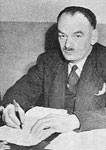HISTORY OF THE NORTHERN MANUFACTURING CO. LTD., GAINSBOROUGH
(See also History of Rose Brothers (Gainsborough))
In the first years of the 20th century, William Rose needed so many gears for both his cars and wrapping machines that he installed his own gear cutting machinery. A department was set up for gear cutting and, because of the large number of machines required to produce all of the types of gears used, capacity expanded far beyond his own needs and he began to supply gears to other firms. As a result the Northern Manufacturing Company was formed in September 1906.
 T.H.
Phillipson, a director of both Northern and Rose, recalled that in the
early days of the company it took on a number of unusual projects:
T.H.
Phillipson, a director of both Northern and Rose, recalled that in the
early days of the company it took on a number of unusual projects:
"Apart from the range of gear cutting machinery, we were also equipped with our own turning, milling and grinding machinery and the whole was originally housed in the one long bay where the turning section now is. It's interesting to note that in those early days there seemed to be a constant stream of orders for loose gearing from the firm of Werner, Pfleiderer & Perkins, of Peterborough.
Right for the outset, Northern were always willing to have a go at anything special. About 1914, we had a contract for the Commissioners of Irish Lights for building rotation machines for lighthouses. Around the same time, we were building large starting-up equipment for printing presses. After that we built cocoa machinery and a batch of paint pug mills. We also built ammunition hoists for warships and large propeller shaft clutches for submarines.
The Northern was the first company to design and build a satisfactory screw-jacking system for orchestra and organ console lifts when these first became fashionable.. Between the wars, they also had a large contract for the building of tobacco feeds for cigarette machines.

William (Billy) Hunter who was managing director of the Northern Manufacturing Co, joined the Rose organisation in 1909. He was made a technical director of the firm in 1946 and was awarded the MBE for his work on important government contracts in 1949. Connected with Northern from its earliest days, Mr Hunter could remember a time when the four-man drawing office staff drew a total of around 30s a week in wages. He retired in 1964 after 54 years service.
Although part of the Rose set up at Gainsborough, Northern Manufacturing had a definite existence of its own, with its own office and sales force. By 1966, Northern employed around 140 people and were turning out gears from half-an-inch in diameter to 13 ft. 6ins. in diameter.
The gears and gearboxes were used in practically all industries, particularly plastics and rubber machinery, sugar machinery and paper and printing machinery. Many passenger and goods lifts used Northern gears or gearboxes. Around half the company's output was in loose gears, the other half in gearboxes. After the formation of Rose Forgrove in 1967, Northern Manufacturing was re-named – N.M.C. Gears, Rose Division.
Despite 63 years of operation, N.M.C Gears was closed down at the end of 1969. The Rose division's management had decided to concentrate capital and manpower resources into those activities in which the company felt best able to compete. N.M.C. Gears represented under 7.5% of the Rose division's output and it was considered that any attempt to improve N.M.C Gears' competitive position to a size that its competitors enjoyed would detract from Rose's high potential in its other major interests – wrapping and packaging machinery, spherical bearings and aeromarine products.
The effect on the workforce was tempered somewhat by the vacancies created by the transfer of the Job Day division from Leeds to Gainsborough in 1970. (See The History of Job Day).
All content © the Website Authors unless stated otherwise.
